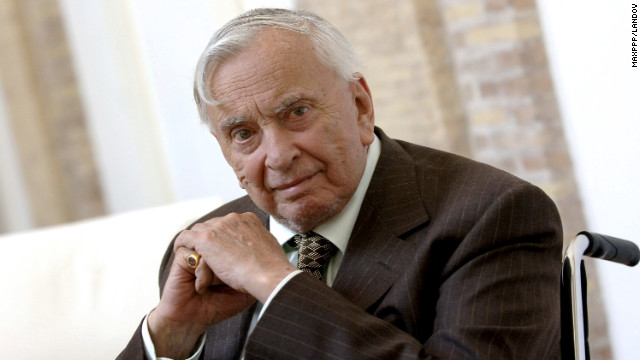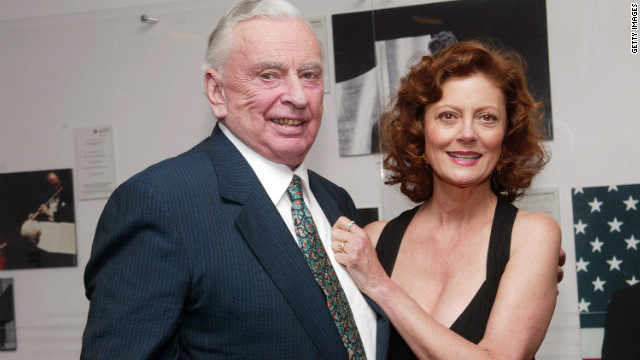 Gore Vidal, the novelist, essayist and playwright, will be remembered as much for his outspokenness and scorn for popular culture and politics as for his 60-year writing career.
Gore Vidal, the novelist, essayist and playwright, will be remembered as much for his outspokenness and scorn for popular culture and politics as for his 60-year writing career.He died Tuesday at age 86.
His nephew, Burr Steers, said Vidal died at his home in the Hollywood Hills of complications from pneumonia. Vidal had been living alone in the home and had been sick for "quite a while," Steers said.
In 2008, he said, America is "rotting away" — and not to expect President Obama to save it.
In this Dec. 9, 1974 photo, author Gore Vidal discusses Hollywood unions, politics, lecturing and publicizing books during an interview in Los Angeles.
Vidal was born into the establishment on Oct. 3, 1925, at West Point, N.Y.
His father, a former West Point football star, was the military academy's first aviation instructor. He also was one of the founders of TWA, the airline giant, and had a love affair with Amelia Earhart.
Vidal's mother was an actress and socialite who, according to her son, had an "on-and-off affair with Clark Gable."
As a boy, Vidal lived in Washington, D.C., with his namesake, his maternal grandfather, Oklahoma's legendary blind senator, Thomas P. Gore.
After prep school, Vidal didn't attend college, but said he received a great education just by reading to his grandfather.

Vidal also was a distant cousin of former vice president Al Gore, whom he avoided, as he put it, "on the ground that one day plausible deniability will be useful to each of us."
His awards included the National Book Award in 1993 for United States: Essays 1952-1992 and the National Book Critics Circle Award for criticism in 1982 for The Second American Revolution and Other Essays.
Though he once swore he would never write about himself, his first memoir, Palimpsest (1995), covers the first four decades of his life in which he ran for office and worked as a scriptwriter and playwright.
His second memoir, Point to Point Navigation (2006), is a Who's Who's list of celebrities including JFK, Jacqueline Kennedy, Tennessee Williams, Eleanor Roosevelt, Orson Welles, Greta Garbo, Federico Fellini, Rudolph Nureyev, Elia Kazan and Francis Ford Coppola.
In it, he also wrote about the illness and death in 2003 of his partner of five decades, Howard Austen. They lived in self-imposed exile in Ravello, Italy, for more than 30 years.
Of their relationship, Vidal wrote, "It's easy to sustain a relationship when sex plays no part and impossible, I have observed, when it does."
During World War II, Vidal joined the Army at the age of 17. He drew upon his experiences as the first-mate on an Army supply ship in the Aleutian Islands for his debut novel, Williwaw (1946).
 Fame came later with his third book, The City and the Pillar (1948), the first American novel to deal frankly and positively with homosexual love.
Fame came later with his third book, The City and the Pillar (1948), the first American novel to deal frankly and positively with homosexual love.He was viciously criticized for it, but he attracted the notoriety he would rail against and savor for the rest of his life.
Vidal resisted being called gay, saying there was no such thing as a homosexual person, only homosexual acts.
His life was filled with connections to the rich and famous. His mother married Jacqueline Kennedy's stepfather. He was friends with John F. Kennedy and actors such as Susan Sarandon, Paul Newman and Eli Wallach.
In November 2009, when he received a lifetime achievement award at the National Book Awards, Vidal was introduced by Newman's widow, actress Joanne Woodward. She recalled what Vidal said when he became the godfather of Woodward's and Paul Newman's first child: "Always a godfather, never a god."
Twice he ran unsuccessfully for political office: for Congress in Upstate New York in 1960 and for the Senate in California in 1982.
 Some of his best known novels grew out of his fascination with politics and history, including Washington, D.C. (1967), Lincoln (1973) and Burr (1984), which is about Vice President Aaron Burr, who killed Alexander Hamilton in a duel in 1804.
Some of his best known novels grew out of his fascination with politics and history, including Washington, D.C. (1967), Lincoln (1973) and Burr (1984), which is about Vice President Aaron Burr, who killed Alexander Hamilton in a duel in 1804.His political plays include The Best Man and An Evening with Richard Nixon.
But he'll be best remembered by many for events that had nothing to do with his books.
In a 1968 TV appearance, he goaded conservative William F. Buckley, who yelled at him, "Now listen, you queer. Stop calling me a crypto-Nazi, or I'll sock you in the god---- face and you'll stay plastered."
In 2008, The New York Times asked Vidal how he felt when he heard that Buckley had died: "I thought hell is bound to be a livelier place, as he joins forever those whom he served in life, applauding their prejudices and fanning their hatred," he responded.
In the '60s and '70s, Vidal was a frequent guest on Johnny Carson's Tonight Show, lauded as a witty, entertaining raconteur. More recently, he voiced himself on TheSimpsons and Family Guy and appeared on the parody Da Ali G Show, where Ali G (Sacha Baron Cohen) mistook him for Vidal Sassoon.
Vidal seemed to court controversy. Convicted Oklahoma City bomber Timothy McVeigh contacted Vidal after he read Vidal's 1998 Vanity Fair essay that criticized the war on drugs, inadequate health care for the poor and government monitoring of phone calls.
 |
| With Susan Sarandon |
Vidal was one of five people invited by McVeigh to attend his 2001 execution. He planned to write about it for Vanity Fair but at the last minute did not attend.
He also loved movies and was an accomplished screenwriter. In Hollywood, he contributed to the scripts of Ben-Hur, Suddenly Last Summer and The Catered Affair.
One of his best known novels, Myra Breckinridge, a satire that dealt with transexuality and pornography, was considered shocking when it was published in 1970. It was turned into a movie with Rex Reed and Raquel Welch, which Vidal was said to dislike intensely.

During the Bill Clinton-Monica Lewinsky scandal, he suggested that prosecutor Kenneth Starr be tried for treason for trying to override the results of two presidential elections.
He attacked the Supreme Court's "purloining" of the 2000 presidential election and said that Americans who died on 9/11 were as much victims of U.S. foreign policy as victims of terrorism.
He also said, "I am told the Cheney-Bush team dislikes their junta being compared to the Nazis. If they ceased behaving like Nazis, no comparison would come to mind."
His favorite president was Franklin Roosevelt: "When I say president," he said in 2009, "I still mean Roosevelt — wisely, I think."
He criticized President Bush for the Iraq War and President Obama for continuing the Afghanistan War. In a rambling speech at the National Book Awards in 2009, Vidal asked, "Didn't George Washington say, 'He who controls Afghanistan will carry New Jersey?' ''
Critic Adam Goodheart wrote that Vidal was "ironic, cosmopolitan, erudite, a sexual non-conformist with a superbly honed sense of envy who needs to be both gate-crasher and guest of honor at every party."
By Carol Memmott and Bob Minzesheimer, USA TODAY
---------------------
http://www.usatoday.com/life/people/obit/story/2012-08-01/gore-vidal-dies/56631952/1
http://i2.cdn.turner.com/cnn/dam/assets/120801101837-gore-vidal-1-horizontal-gallery.jpg
http://resources3.news.com.au/images/2012/08/01/1226440/475175-gore-vidal.jpg
http://www.vanityfair.com/dam/politics/2010/02/hitchens-1002-01.jpg
http://media.nj.com/entertainment_impact/photo/11375089-large.jpg
http://i2.cdn.turner.com/cnn/dam/assets/120801102549-gore-vidal-7-horizontal-gallery.jpg


No comments:
Post a Comment